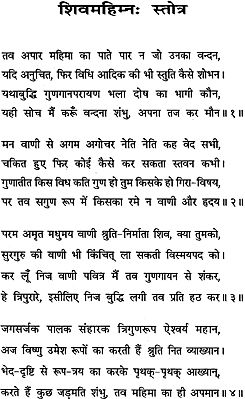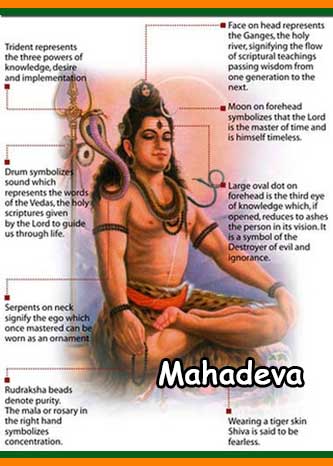

Here, we take a deeper look at Ravana, who was a great devotee and an artist. Most know the arrogant, egoistic side of Ravana, but only a few know about his devotion to Lord Shiva. Ravana was infamous in the great Indian epic Ramayana for abducting Sita, wife of Lord Rama. Shiva Tandava Stotram was written by Ravana centuries ago. He was one of the most ardent devotees of Lord Shiva. Have you wondered who the composer of this beautiful Shiva Tandava Stotram is? It was King Ravana! What an amazing description of Lord Shiva! Such descriptions are usually written by those who are steeped in love or devotion. Salutations to Lord Shiva, whose hair is like a dense forest, whose throat is wet by the pure, flowing water of the Ganga the snakes resting around the neck of Shiva are like long garlands Damad-damad-damad - is the sound of drums that describes the passionate dance of the fearless Lord Shiva. Benefit of singing Shivmahimna stotra is far greater than either the benefit of spiritual initiation (दीक्षा), charity (दान), austerity (तप), pilgrimage (तीर्थ), knowledge of the scriptures (ज्ञान), or the performance of ceremonial sacrifice (यज्ञ-याग).Shiv Tandav Stotram by Ravana Jatakatahasambhrama bhramanilimpanirjhari "Anyone who recites this hymn with a pure heart and devotion will be blessed with fame (कीर्ति), wealth (धन), long life (आयु) and many children (सुत) in this mortal world, and will attain Kailas (Shiva's abode) after death. This very prayer became well known as the 'Shiva Mahimna Stotra'. Lord Shiva, was pleased with his prayers, absolved him and returned his divine powers. In order to seek forgiveness and please Lord Shiva, Pushpadant composed a stotra (song of praise) in which he elaborated at length upon Shiva's greatness as a prayer. He was shocked, but being a blessed devotee, he realized why that happened. This infuriated Lord Shiva and he punished Pushpadanta by taking away his divine powers. Pushpadanta was unaware of this and unknowingly stepped on the bilva leaves. Left with no ideas to solve this problem, the king spread bilva leaves or bilipatra (बिलीपत्र - AEGLE MARMELOS tree leaves, which are considered to be sacred offerings to Lord Shiva) in his garden. But Pushpadanta had divine powers to be invisible and hence, the king could not find the culprit. The King did all he could to address the issue. As a result, King Chitraratha was left with no flowers to complete his prayers to Lord Shiva.

Every day he tried to stop himself, but failed and picked up the flowers. Pushpadanta was so awestruck by the beauty of the garden, that he could not control his emotions and picked up the flowers from the garden.

The King used to offer flowers from his palatial garden as a symbol of his devotion to Lord Shiva. It was King Chitraratha's royal garden, who was also a devotee of Lord Shiva. Once he happened to see a beautiful garden adorned with charming flowers. Pushpadanta was also a devotee of Lord Shiva and a lover of flowers. Pushpadanta (literally, Flower-Teethed) was a divine musician of such standing, in the court of Lord Indra(King of the Gods). They are not necessarily spiritually realised, but are superior to humans. Along with the kinnar (nymphs), yaksha (archangels), apsara (celestial dancers) etc., gandharva are beings which are said to live in the skies and in the atmosphere, in contact with the higher plane: that of the Gods. Pushpadanta was a Gandharva(गांधर्व), a celestial musician. The famous and oft-repeated Sanskrit shloka Asiti girisamam., which means ‘ if an ocean is made the inkpot, the branch of the mythical Parijata tree made the pen and Goddess Saraswati (The Goddess of Knowledge) embarks to write the glory of Lord ( Shiva), it still will be impossible to comprehend the greatness of the Lord fully’ – is among the verses of this stotra. In the verses of the Stotram lie stories about various great acts of the Mahadeva. The thought behind the composition is ‘Enumerating the greatness of Shiva’, being a typical frame of devotion and dedication.


 0 kommentar(er)
0 kommentar(er)
